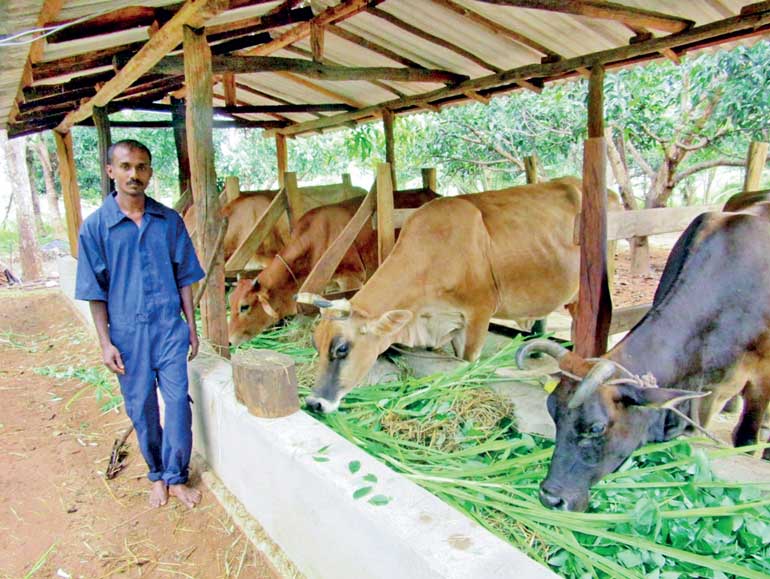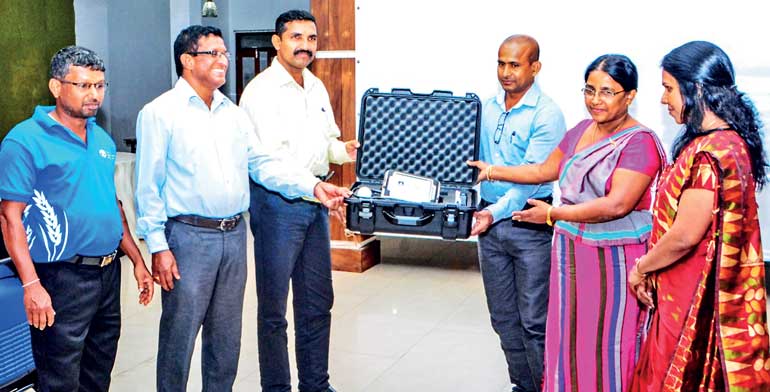Thursday Feb 19, 2026
Thursday Feb 19, 2026
Tuesday, 3 April 2018 00:00 - - {{hitsCtrl.values.hits}}

Vinod Saranga, a successful dairy farmer in Maligawila, Monaragala who embarked on the venture through the European Union Support to District Development Programme and the Food and Agriculture Organization. His integrated farm
gets a sizeable income from his semi-intensive dairy business

A portable ultrasound scanner capable of diagnosing pregnancy in cattle handed over to the Department of Animal Production and Health
The Food and Agriculture Organization (FAO) of the United Nations component in the implementation of the European Union Support to District Development Programme (EU-SDDP) is nearing its successful completion this May, 2018. The program helped low income-earners in the agriculture sector in Sri Lanka by providing basic infrastructure and services that benefit the local economy.
The action of FAO in EU-SDDP focused on ‘Poverty Reduction through Agricultural Development’. In Monaragala District, the FAO project was implemented in the five selected Divisional Secretariat Divisions of Monaragala, Buttala, Siyambalanduwa, Madulla and Katharagama.
In view of the closure, a knowledge sharing district workshop was organised in Monaragala District to showcase achievements of project activities that focused on agriculture, livestock, inland fisheries and irrigation sector development. The sharing of lessons learnt and promotion of best practices and replicable models among all partners was central to the event, while it is of paramount importance to ensure the sustainability of interventions, together with its adaption and improvement by likeminded agencies – prerequisites to ensure a smooth transition at the exit stage of the project.
A few of the key successes in Monaragala District are: the introduction of the 4-cow model to small scale dairy farmers to practice the semi-intensive management system on existing cattle of in the dry zone to help expand their herd to 10 milking cows under a day and night feeding programme. The continuous drinking water supply and feed has been enhanced through fodder cultivations and mechanised chopping. The particular method has shown positive results with successful farmers able to milk more than 5 litres per cow per day – with qualitative improvement as well.
Meanwhile, inputs and training provided to farmers for export-oriented mango cultivation has led to sustainable incomes. A contract farming agreement in place through a commercial-level partnership has laid the path for farmers to receive a fair price for their produce in a timely manner. Further, one hundred families in the district, with a focus on women’s participation, were assisted in bee keeping together with a private entity buy back agreement. Moreover, the promotion of mushroom cultivation among women as an additional household income source – with relatively low time and labour investments - has strengthened producer groups and created access to market linkages.
In the long run, work done to develop the ecosystem in Podiwewa will play an important role in maintaining environmental equilibrium and protecting the banks of the tank from erosion and encroachment. The variety of kumbuk, tamaraind, mee and karanda, and palmyrah trees planted in the up-stream and down-stream sections will act as a natural wind breaker.
Moreover, the rehabilitation of five minor irrigation tanks saw the construction of the spill, main canal, sluice, culvert, bund and access road in order to increase the extent of irrigated land during the Yala and Maha cultivation seasons.
Thus, the project which commenced activities in Monaragala District to support smallholder producers has helped this segment increase the quality and quantity of their production. Overall, it has ensured that marketing linkages and networks to support the increase in production are firmly in place; provided trainings on managing production increases, reducing post-harvest losses and developing capacity; and has increased strands of the value chain by identifying more activities that could sustain the replicable models.
The next step for the sustainability of the interventions introduced by FAO is for like-minded agencies to scale up replicable models by increasing the number of beneficiaries and expanding the models in the same district and to other districts.
Jointly implemented by five agencies of the United Nations namely FAO, UNDP, UNICEF, UNOPS, and ILO, and IFC from the World Bank Group, the EU-SDDP is a European Union-funded development cooperation programme with a total financial grant support of EUR 60 million. Its objective is to contribute to poverty reduction and livelihood development in seven districts in the North and East to bridge the socio-economic gap with the rest of the country. The program supports the conflict-affected districts of Batticaloa, Mannar, Vavuniya, Ampara, Monaragala, Anuradhapura and Puttalam impacting half a million people.